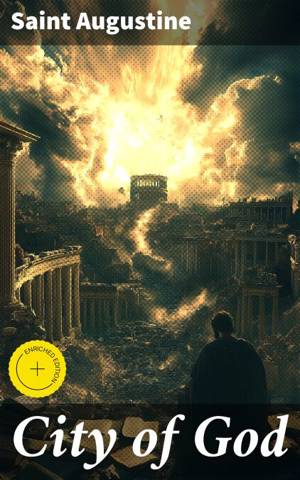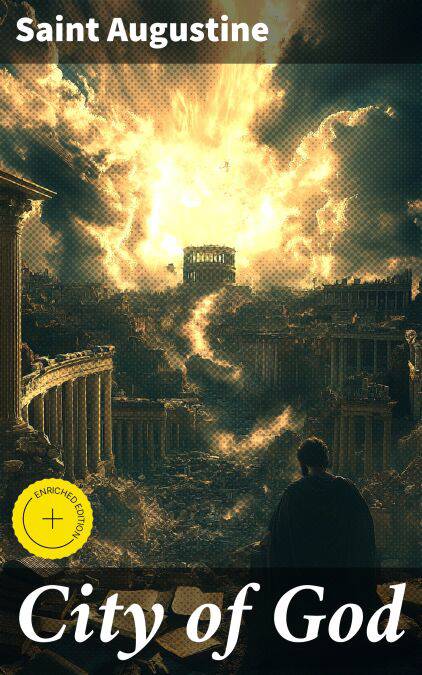
- Afhalen na 1 uur in een winkel met voorraad
- Gratis thuislevering in België vanaf € 30
- Ruim aanbod met 7 miljoen producten
- Afhalen na 1 uur in een winkel met voorraad
- Gratis thuislevering in België vanaf € 30
- Ruim aanbod met 7 miljoen producten
Zoeken
City of God E-BOOK
Enriched edition. Treatise on the State of God Against the Pagans
Saint Augustine
E-book | Engels
€ 1,99
+ 1 punten
Uitvoering
Omschrijving
Saint Augustine's "City of God" emerges as a monumental work in the realm of political philosophy and theology, written in the aftermath of Rome's fall in 410 A.D. This extensive treatise, spanning over twenty-two books, juxtaposes the earthly city, characterized by human ambition and moral decay, against the eternal city of God, which symbolizes divine grace and ultimate salvation. Augustine's prose is a blend of profound philosophical inquiry and impassioned rhetoric, reflecting a deep engagement with contemporary pagan and Christian thought, particularly in response to allegations that Christianity led to Rome's decline. The text makes a significant contribution to the discourse on the nature of human societies and the providential role of God in history. Saint Augustine, one of the most influential early Church Fathers, wrote "City of God" during a period of personal and societal upheaval, grappling with the implications of historical events that challenged the foundations of faith. His experiences as a philosopher, a bishop of Hippo, and a convert from Manichaeism informed his synthesis of classical philosophy and Christian doctrine, offering readers a uniquely rich perspective drawn from both his intellectual and spiritual journeys. "City of God" is essential for anyone seeking understanding of the Christian response to societal collapse and the intricate relationship between faith and politics. Its relevance extends to modern discussions on governance, morality, and the purpose of human society, making it a timeless read that invites reflection on the nature of civilization and spirituality.
In this enriched edition, we have carefully created added value for your reading experience:
- A succinct Introduction situates the work's timeless appeal and themes.
- The Synopsis outlines the central plot, highlighting key developments without spoiling critical twists.
- A detailed Historical Context immerses you in the era's events and influences that shaped the writing.
- An Author Biography reveals milestones in the author's life, illuminating the personal insights behind the text.
- A thorough Analysis dissects symbols, motifs, and character arcs to unearth underlying meanings.
- Reflection questions prompt you to engage personally with the work's messages, connecting them to modern life.
- Hand‐picked Memorable Quotes shine a spotlight on moments of literary brilliance.
- Interactive footnotes clarify unusual references, historical allusions, and archaic phrases for an effortless, more informed read.
In this enriched edition, we have carefully created added value for your reading experience:
- A succinct Introduction situates the work's timeless appeal and themes.
- The Synopsis outlines the central plot, highlighting key developments without spoiling critical twists.
- A detailed Historical Context immerses you in the era's events and influences that shaped the writing.
- An Author Biography reveals milestones in the author's life, illuminating the personal insights behind the text.
- A thorough Analysis dissects symbols, motifs, and character arcs to unearth underlying meanings.
- Reflection questions prompt you to engage personally with the work's messages, connecting them to modern life.
- Hand‐picked Memorable Quotes shine a spotlight on moments of literary brilliance.
- Interactive footnotes clarify unusual references, historical allusions, and archaic phrases for an effortless, more informed read.
Specificaties
Betrokkenen
- Auteur(s):
- Vertaler(s):
- Uitgeverij:
Inhoud
- Aantal bladzijden:
- 1280
- Taal:
- Engels
Eigenschappen
- Productcode (EAN):
- 8596547776970
- Verschijningsdatum:
- 12/12/2023
- Uitvoering:
- E-book
- Beveiligd met:
- Digital watermarking
- Formaat:
- ePub

Alleen bij Standaard Boekhandel
+ 1 punten op je klantenkaart van Standaard Boekhandel
Beoordelingen
We publiceren alleen reviews die voldoen aan de voorwaarden voor reviews. Bekijk onze voorwaarden voor reviews.







